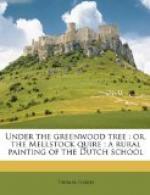“Good-evening, Miss Day.”
“Good-evening, Mr. Maybold,” she said, in a strange state of mind. She had noticed, beyond the ardent hue of his face, that his voice had a singular tremor in it, and that his hand shook like an aspen leaf when he laid his umbrella in the corner of the porch. Without another word being spoken by either, he came into the schoolroom, shut the door, and moved close to her. Once inside, the expression of his face was no more discernible, by reason of the increasing dusk of evening.
“I want to speak to you,” he then said; “seriously—on a perhaps unexpected subject, but one which is all the world to me—I don’t know what it may be to you, Miss Day.”
No reply.
“Fancy, I have come to ask you if you will be my wife?”
As a person who has been idly amusing himself with rolling a snowball might start at finding he had set in motion an avalanche, so did Fancy start at these words from the vicar. And in the dead silence which followed them, the breathings of the man and of the woman could be distinctly and separately heard; and there was this difference between them—his respirations gradually grew quieter and less rapid after the enunciation hers, from having been low and regular, increased in quickness and force, till she almost panted.
“I cannot, I cannot, Mr. Maybold—I cannot! Don’t ask me!” she said.
“Don’t answer in a hurry!” he entreated. “And do listen to me. This is no sudden feeling on my part. I have loved you for more than six months! Perhaps my late interest in teaching the children here has not been so single-minded as it seemed. You will understand my motive—like me better, perhaps, for honestly telling you that I have struggled against my emotion continually, because I have thought that it was not well for me to love you! But I resolved to struggle no longer; I have examined the feeling; and the love I bear you is as genuine as that I could bear any woman! I see your great charm; I respect your natural talents, and the refinement they have brought into your nature—they are quite enough, and more than enough for me! They are equal to anything ever required of the mistress of a quiet parsonage-house—the place in which I shall pass my days, wherever it may be situated. O Fancy, I have watched you, criticized you even severely, brought my feelings to the light of judgment, and still have found them rational, and such as any man might have expected to be inspired with by a woman like you! So there is nothing hurried, secret, or untoward in my desire to do this. Fancy, will you marry me?”
No answer was returned.
“Don’t refuse; don’t,” he implored. “It would be foolish of you—I mean cruel! Of course we would not live here, Fancy. I have had for a long time the offer of an exchange of livings with a friend in Yorkshire, but I have hitherto refused on account of my mother. There we would go. Your musical powers shall be still further developed; you shall have whatever pianoforte you like; you shall have anything, Fancy, anything to make you happy—pony-carriage, flowers, birds, pleasant society; yes, you have enough in you for any society, after a few months of travel with me! Will you, Fancy, marry me?”




